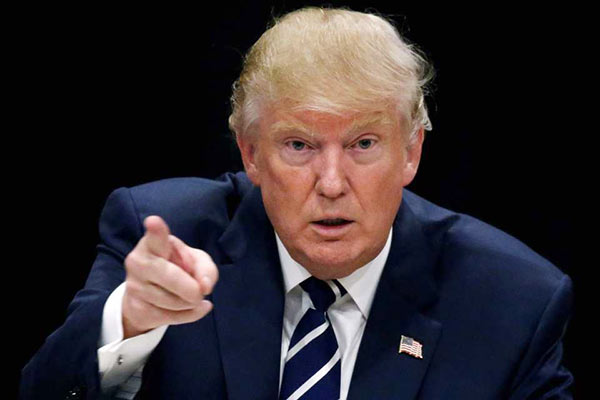Trump raises stakes in trade war with China with tariffs on another $200 billion goods

The White House said Monday evening that if China goes through with its promise to retaliate against the US tariffs announced last week, the United States will impose tariffs on an additional $200 billion worth of Chinese goods.
“Further action must be taken to encourage China to change its unfair practices, open its market to United States goods, and accept a more balanced trade relationship with the United States,” Trump said in a statement.
The Trump administration said Friday that it will impose a 25% tariff on $50 billion of Chinese exports. China, claiming the United States had “launched a trade war,” retaliated almost immediately, outlining its own tariffs on US goods worth $50 billion.
The escalating conflict between the world’s two largest economies has rattled markets and companies, which fear disruption to their global supply chains.
The Chinese Commerce Ministry reacted quickly to Trump’s announcement, accusing the United States of “extreme pressure and extortionist behavior” and warning it would “strike back hard.”
The Trump tariffs, which the US government says are punishment for intellectual property theft, will be enacted in two waves. More than 800 exports, about $34 billion worth, will be subject to tariffs starting July 6. Another 280 or so still need to undergo a public comment period, and will take effect later.
Trump said Monday that China’s response “indicates its determination to keep the United States at a permanent and unfair disadvantage.” China’s tariffs would target agricultural products, cars and seafood, among other items.
“China apparently has no intention of changing its unfair practices related to the acquisition of American intellectual property and technology,” he said. “Rather than altering those practices, it is now threatening United States companies, workers, and farmers who have done nothing wrong.”
He directed Trade Representative Robert Lighthizer to identify $200 billion worth of Chinese goods for additional 10% tariffs, which would be enacted “if China refuses to change its practices, and also if it insists on going forward with the new tariffs that it has recently announced.”
The planned new wave of tariffs would have to go through the same process of public consultation and comment before taking effect.
“If the United States loses its senses and comes up with a new list, China will be forced to strike back hard, and launch comprehensive measures that match the US move in quantity and quality,” the Chinese Commerce Ministry said in a statement Tuesday.
But Beijing faces challenges in retaliating directly: China ships far more goods to the United States ($505 billion last year, according to US figures) than come back in the opposite direction ($130 billion).
To respond to Trump’s threat to impose tariffs on as much as $250 billion worth of Chinese goods, Beijing would have to find other ways to respond.
Analysts say the Chinese government could target trade in services between the two countries rather than physical products. That means things like tourism and education, industries from which the United States benefits a lot more than China does.
Beijing could also seek to make life difficult for big US companies that rely on the Chinese market for a big chunk of their revenue. It showed a willingness to do that to South Korean businesses last year during a period of tension between the two Asian countries.
Top US brands such as Apple (AAPL), GM (GM) and Boeing (BA) generate large amounts of sales in China.
In an interview with CNN earlier this month, Apple CEO Tim Cook said he didn’t expect a full-blown trade war to break out and dismissed the notion that iPhones, which are assembled in China, would end up subject to tariffs.
But analysts say it’s unclear which government will back down in the confrontation, predicting both economies will be able to withstand the initial waves of tariffs without much impact on overall growth.
“Neither side will be brought to its knees — which is one reason to think the trade dispute could drag on,” research firm Capital Economics said in a note to clients on Friday. “For China’s part, its leaders will be determined not to be seen to back down to foreign pressure.”
(Source: CNN)

Latest Headlines in Sri Lanka
- IGP Deshabandu Tennakoon’s assets to be frozen if he evades court – Minister March 9, 2025
- Sri Lanka to introduce low-priced alcohol to curb illicit liquor consumption March 9, 2025
- Oddusuddan Tile Factory reopens after 35 years March 9, 2025
- Elephant Pass salt factory to be opened to the public on March 26, 2025 March 9, 2025
- Sri Lanka’s Public Finance Committee approves excise duty hike on liquor March 8, 2025


